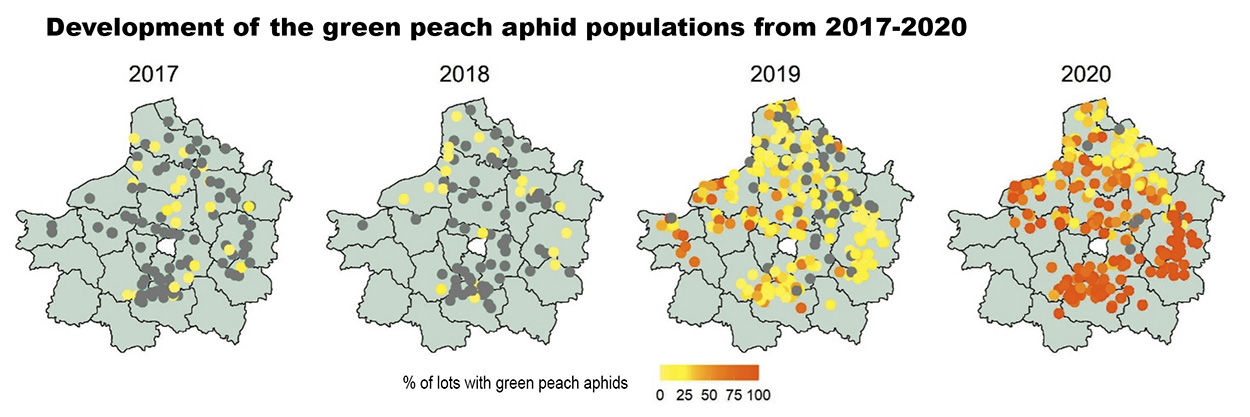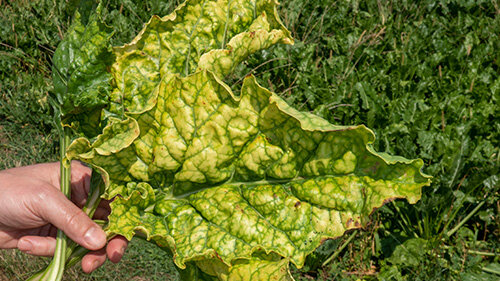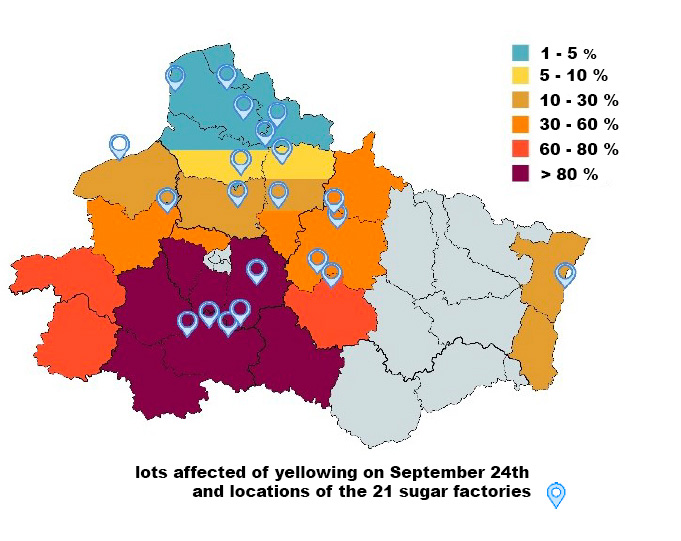France is heading for the worst beet harvest in decades. The primary reason being the unexpectedly massive occurrence of beet yellowing caused by viruses. The statistical division of the French agricultural ministry, Agreste, estimates that beet yield per hectare will be 16% lower in 2020 than the five-year average. Together with the significant reduction in beet acreage by French beet growers, the country’s sugar production is likely to decrease by more than 20% compared to the previous year.
Initially, particularly the southern zones of beet cultivation regions in France, which all lay in the North of the “hexagon”, were affected. In the course of June and July, however, the disease also became more pronounced in the north, leaving only the northernmost cultivation area, Pas de Calais, largely unaffected.
Development of the number of plots with yellowing viruses
| Departments | June, 9th | June, 23rd | June, 30th |
|---|---|---|---|
| Alsace | 5% | 50% | |
| Aisne | <1% | 70% | 90% |
| Ardennes | <1% | 50% | 50% |
| Marne | <1% | 70% | 90% |
| North | |||
| Pas-de-Calais | <1% | 5% | 5% |
| Seine-Maritime | <1% | 100% | 100% |
| Oise | <1% | 90% | 90% |
| Val d'Oise | <5% | 90% | 90% |
| Eure | <5% | 100% | 100% |
| Somme | <5% | 90% | 90% |
| Aube | 10% | 75% | 90% |
| Yonne | 10% | 90% | 90% |
| Île-de-France | 70% | 100% | 100% |
| Loiret, Eure-et-Loir, Loir-et-Cher | 80% | 100% | 100% |
The severity of the situation is illustrated by the fact that the start of the campaign in Connantre, the largest sugar factory in the Champagne and flagship of the Tereos Group, had to be postponed to October 2nd. There is serious concern that the short campaigns and poor beet yields are putting farmers and sugar companies in jeopardy. 46,000 jobs in agriculture and sugar industry are at risk. Therefore, beet grower association CGB and sugar factories, united in the interbranch organisation AIBS, started an initiative for a derogation from the neonicotinoid ban in sugar beet coating established in 2018.
Since the ban was enacted as a law in France, a new legislative procedure was now needed to repeal. France’s agricultural minister Julien Denormandie surprisingly gained support of environmental secretary Barbara Pompili, a former eco-activist, to introduce a bailout plan for the nation’s sugar sector including a neonicotinoid derogation for sugar beet coating for 3 years. It passed in the government’s cabinet in early September. On October 6th after a five hour first reading in parliament the day before, it was voted on with a majority of nearly 60%. The approval of the senate is expected until the end of October.

Already in October 2019, the French institute for sugar beet research "Institut Technique de la Betterave" (ITB) had detected yellowing viruses in 90 of 96 beet samples in 14 different departments during a routine check-up, but the BY virus, which is considered to be the cause of particularly severe yellowing, was only found in 7% of the samples. In May 2020 the ITB then informed of an unexpectedly high lice infestation for the first time. Surprisingly, this year from the start many green peach aphids, which are the most important virus carriers, were detected in France. Although a warning system with calls to insecticide applications was established, the spread of the virus could not be stopped effectively with the available measures. It can be assumed that the emergency approval of neonicotinoid seed treatment of sugar beets in France will be granted for the year 2021 and the following two.



